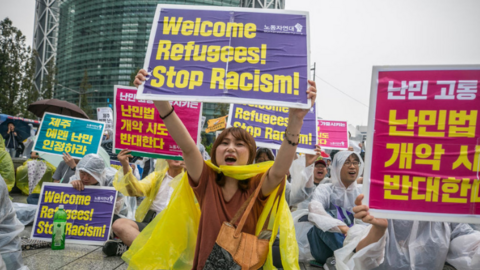Nationalism and Racism

Nationalism and Racism
Research Focus
Racism is commonly theorized from the Western perspective but is also prevalent in non-Western contexts. The resurgence of nationalism and its interplay with racism, often salient in the populist politics that espouse such ideologies to construct the notion of “the people,” can be observed not only in Western liberal democracies but also in many other places with different political systems and cultures. This has complicated how many countries approach various social, political, and economic challenges including democratic backsliding, immigration and refugee crises, economic inequality, and even foreign policy decisions in dynamic international relations.
The National and Racism research track explores how nationalism and racism intertwine to create various forms of suppression and intolerance across the Asia-Pacific region. It examines unique cases of racism in the region, analyzing their defining features and underlying patterns. The research seeks to uncover how race is conceptualized by/among different actors, including the ruling elite, the media, and the public in various Asian countries, and how these conceptualizations may resemble or differ from racism in other parts of the world. It thereby interrogates how the concept of racism is applied to the region, and what other elements — religion, socioeconomic status, gender, historical memory, and more — factor into racism.
This research is part of the Stanford Next Asia Policy Lab (SNAPL).
Projects in this research track include:
Racism "Denial" in Asia: Critical Discourse Analysis of UN CERD State Reports, 1978-2023 (Junki Nakahara and Gi-Wook Shin)
This study examines racism “denial” in Asia through a critical discourse analysis of state reports submitted to the United Nations’ Committee on the Elimination of Racial Discrimination (CERD) by 16 Asian countries from 1978 to 2023. Our findings reveal that denial is not just a rhetorical tool for deflecting accusations but functions as a deeply embedded mechanism to justify and reinforce existing discrimination. Importantly, these state discourses are shaped by social, political, and religious values, as well as struggles for national liberation, unity, and security. By unpacking these layers in historically and comparatively informed ways, we identify and classify patterns of discursive denial – literal, interpretive, and ideological – with subcategories for each. This study not only adds to empirical inquiry into racism in often-neglected Asian contexts but also presents a conceptual framework for examining the diverse manifestations and articulations of race and racism, extending beyond the explanatory capacity of existing dominant theories of race developed through Western lenses.
The article is now available online in Critical Sociology.
A Dialectical Process of Appropriation: Asian States and UN CERD Over Race and Racism (Junki Nakahara and Gi-Wook Shin)
This study examines how 16 Asian states construct and reconstruct race, racism, and racial discrimination through their iterative engagement with the United Nations Committee on the Elimination of Racial Discrimination (CERD). We refine the concept of nationalist appropriation, defined as a “discursive mechanism of selective reinterpretations of ideas and concepts to serve the (re)construction, representation, and legitimation of dominant ideological frameworks of nationhood and national identity,” to elucidate its entanglements and tensions with globally-promoted anti-racist norms over time. This appropriation, particularly acute across five key thematic areas, takes multiple forms that transcend the binary of adoption vs. rejection or submission vs. subversion: (1) national membership; (2) refugee “inclusion”; (3) securitization; (4) national development; and (5) colonial legacy. This study calls for close attention to the dialectical processes between transnational and national-local stakeholders to better capture the struggles over definitional power surrounding issues of racial discrimination.
The working paper was presented and discussed as part of the Global Research Workshop on May 1, 2025, with Dr. Angana P. Chatterji (UC Berkeley) and Dr. Kiyoteru Tsutsui (Stanford) as discussants.
Development, Nation, and Rule: Postcolonial Modernity and Authoritarian Populism in India and South Korea (Junki Nakahara, Kerstin Norris, and Gi-Wook Shin)
This ongoing project examines how anti-colonial and anti-imperial nationalisms, initially articulated as struggles for liberation, were appropriated and rearticulated into authoritarian state ideologies in postcolonial India and South Korea. Through comparative analysis of Indira Gandhi and Park Chung Hee, we show how these leaders drew upon the revolutionary rhetoric of national unity and exceptionalism to construct the ideal citizen-subject while suppressing class, caste, ethnic, and political dissent. This rearticulated, collectivistic conception of the nation (e.g., Gandhian-Nehruvian and Yi Kwangsurian imaginaries) produced a racialized postcolonial modernity that simultaneously resisted colonial legacies and reproduced their authoritarian logics.
Publications and Related News
Racism “Denial” in Asia: Critical Discourse Analysis of UN CERD State Reports, 1978–2023
In Critical Sociology, June 2025.
South Korea’s Presidential Candidates Face Balancing Act Amid Rising Anti-China Sentiment
The Guardian, March 2022
South Koreans Are Rethinking What China Means to Their Nation
APARC website, February 2022
The Rise of Anti-Chinese Sentiments in South Korea: Political and Security Implications
APARC website, October 2021
